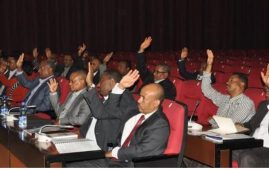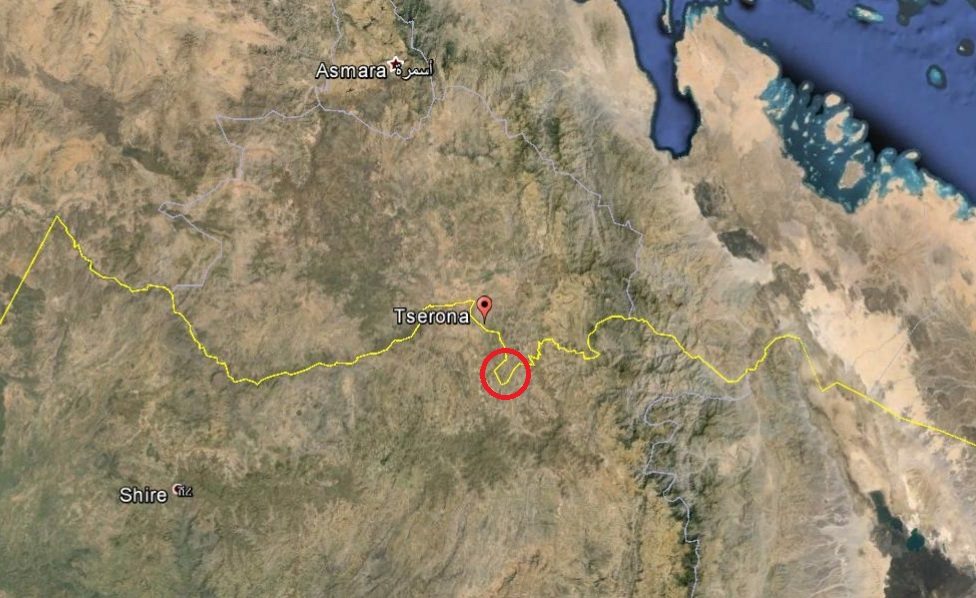Security redoubled for members of the UN Commission of Inquiry on Eritrea following threats and intimidations by pro-regime protesters in Geneva, Switzerland. According to protest organizers, 6,000 people from Eritrea and around Europe protested the Inquiry commission outside the U.N on Monday.
The disclosure was made by the President of the UN Human Right’s Council president in a meeting slated for member states to hear testimonies and discuss the June 8 report of the Commission of Inquiry on Eritrea (CoIE). The 23rd Meeting of the 29th Regular Session of Human Rights Council was held on Wednesday in Geneva.
Council president Joachim Ruecker told the session that:
“Members of the commission had been subjected to various threats and acts of intimidation in their hotel and in the streets since their arrival in Geneva. Security around members of the commission has had to be redoubled… [and] taken security measures to ensure that the interactive dialogue proceed with calm and dignity”.
Reuters reported that Swiss police was guarding the team even inside the United Nations compound in Geneva.
The delegation of the US, Australia and Belgium among others expressed their dismay at the harassment and intimidation against the Commission members’ and urged that it should be “fully investigated”.
The leader of the Inquiry team Mike Smith told Reuters that the threats were related to the Monday demonstration against the inquiry. “Accidentally or not, members of the commission came into contact with some of the demonstrators. And there was a bit of a discussion that got a little bit more than that,” Smith said.
There was also “stuff on the blogosphere” directed at fellow commissioner Sheila Keetharuth, which he said was “not very pleasant”. The government of Eritrea was able to influence Eritrean communities abroad and is very active in promoting its interests abroad, while witnesses were scared to give evidence even though they were living securely outside the country, he added.
Eritrean’s state-owned media reported that the demonstrators emphasized, “Eritrea safeguards the basic rights of its citizens and earned the reputation of being an island of peace and security in a war-torn region”.
The commission’s 485 page report details human rights abuses in Eritrea that may amount to crimes against humanity including extrajudicial killings, widespread torture and enforced labor. It was prepared based on 550 interviews and 160 written statements as Eritrea refused to cooperate with the investigators and let them enter the country.
The EU delegate said, “We are deeply disturbed by your assessment that some violation may amount to crimes against humanity,” while the US delegate noted that, “the Eritrean leadership rules through fear”. The Australian delegation urged that “the perpetrators of such crimes must be held to account.”
The report recommended further examination on whether Eritrea’s government was committing crimes against humanity; therefore, a decision could be taken about whether to refer the case to the ICC. Eritrea’s neighbors Djibouti and Somalia are reportedly supporting a resolution to extend the Commission’s mandate for a year to enable it to declare if crimes against humanity were committed.
The resolution apparently improves the terms of reference of the commission that constrained it from declaring on that.
Eritrean Ambassador Tesfamichael Gerahtu told the council that the inquiry commission was “ignorant”, had “a sinister political agenda” and that the report was “a travesty of justice”.
Joachim Rücker, president of the council, rebuked the Eritrean Ambassador saying “I would like to ask the distinguished delegate from Eritrea to use a language in the future that is adequate for this council and preserves the integrity of our mechanisms.”
************





